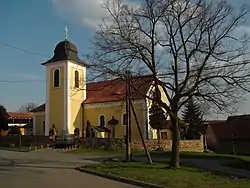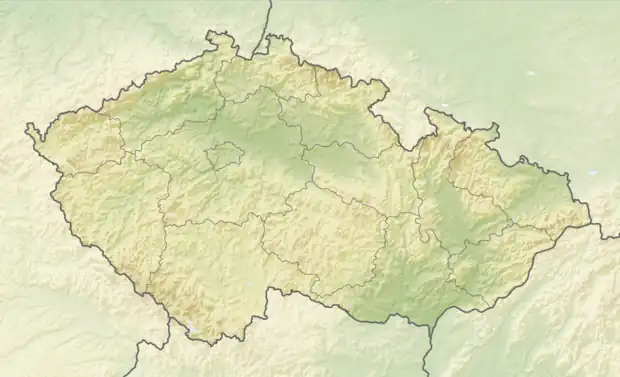Zdislavice
Zdislavice is a market town in Benešov District in the Central Bohemian Region of the Czech Republic. It has about 500 inhabitants.
Zdislavice | |
|---|---|
 Church of Saints Peter and Paul | |
 Flag  Coat of arms | |
 Zdislavice Location in the Czech Republic | |
| Coordinates: 49°41′12″N 14°58′28″E | |
| Country | |
| Region | Central Bohemian |
| District | Benešov |
| First mentioned | 1352 |
| Area | |
| • Total | 6.77 km2 (2.61 sq mi) |
| Elevation | 312 m (1,024 ft) |
| Population (2023-01-01)[1] | |
| • Total | 504 |
| • Density | 74/km2 (190/sq mi) |
| Time zone | UTC+1 (CET) |
| • Summer (DST) | UTC+2 (CEST) |
| Postal code | 257 64 |
| Website | www |
Etymology
The name is derived from the personal name Zdislav, meaning "the village of Zdislav's people".[2]
Geography
Zdislavice is located about 23 kilometres (14 mi) southeast of Benešov and 53 km (33 mi) southeast of Prague. It lies in the Vlašim Uplands. The highest point is at 495 m (1,624 ft) above sea level. The Štěpánovský Stream flows through the market town.
History
The first written mention of Zdislavice is from 1352. Until 1547, the village was part of the Vlašim estate and shared its owners. Knigh Petr of Újezd bought Zdislavice in 1547 and ruled the village for several years. After his rule, Zdislavice was bought by Václav Čejka of Olbramovice and became part of the Kácov estate. In this period, Zdislavice was promoted to a market town.[3]
Sights
The landmark of Zdislavice is the Church of Saints Peter and Paul. The original church, first documented in 1355, was replaced by a new wooden church in 1645. However, this church was burned down in 1699. The current Baroque church was built in 1701–1702.[3][4]
A unique monument is a small ossuary next to the church. It dates from the 18th century.[3]
Gallery
.jpg.webp) Silo
Silo Municipal office
Municipal office Post office
Post office
References
- "Population of Municipalities – 1 January 2023". Czech Statistical Office. 2023-05-23.
- Profous, Antonín (1957). Místní jména v Čechách IV: S–Ž (in Czech). p. 766.
- "Úvod do historie" (in Czech). Městys Zdislavice. Retrieved 2023-03-07.
- "Kostel sv. Petra a Pavla" (in Czech). National Heritage Institute. Retrieved 2023-03-07.